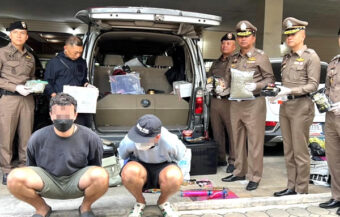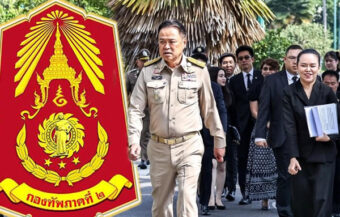Thailand’s tourism industry has taken a hit, falling behind Singapore, Indonesia, and Malaysia in the latest World Economic Forum report. Industry leaders demand urgent action from the government calling for a comprehensive development plan.
The Thai government has found itself under fire after a World Economic Forum tourism index showed the kingdom dropping by 11 places in its 2024 report. The Travel & Tourism Development Index (TTDI) is a broad economic analysis of the tourism industry in countries worldwide. In short, Thailand finds itself behind Singapore, Indonesia, and even Malaysia. In turn, the President of the Association of Thai Travel Agents has called for the Minister of Tourism and Sports Sermsak Pongpanich to come up with a development blueprint for the industry. At the same time, the industry body has criticised the lack of management from the government within the sector.

A leading tourism industry boss has strongly criticised the government’s performance on the development of Thailand’s tourism industry.
It follows the publication of the Travel & Tourism Development Index (TTDI) by the World Economic Forum on May 21st last.
In short, it showed Thailand had fallen sharply in the rankings table. The kingdom fell to 47th from 36th in the previous report. Previously, the first edition of the index was published in 2021.
WEF index is a broader analysis of a country’s tourism sector which looks at sustainability, equality as well as environmental and socio-economic impact
Significantly, this is a broader analysis of the state of the tourism sector involving a wider perspective and engagement with stakeholders.
A complex array of data sources and considerations were monitored.
For instance, the index comprises five key pillars. These range from the enabling of tourism to its sustainability.
Certainly, the first looks at labour skills, hygiene, and health and safety. In addition, it also looks at workers’ rights and equality.
The latter pillar deals with the environmental impact of the country’s tourism activities. In addition, whether such activities are sustainable and their social-economic impacts.
Meanwhile, the three other pillars include the prioritisation of tourism for example improving competitiveness for travellers.
Wide array of bodies and players provide intelligence and input into this influential index which increasingly thinks less of Thailand’s wider tourism industry
After that, there is infrastructure and services followed by resources. The latter includes cultural and tourist attractions as well as the presence of service facilities provided by the world’s large corporations.
Significantly, the index is compiled by the World Economic Forum itself in conjunction with other agencies. For example, the 2024 index includes input from the University of Surrey in the United Kingdom.
At the same time, the index featured inputs from MasterCard and Visa as well as UN agencies and the World Health Organization (WHO).
In addition, it even used research data from the Central Intelligence Agency (CIA) along with others in the aviation industry such as the International Air Transport Association.
At the same time, it is important to note that this is not a market-driven analysis.
In short, it is Thailand’s tourism trade viewed in the eyes of an increasingly political lens being used by world bodies, agencies and indeed large corporations.
World Economic Forum and founder Klaus Schwab have become controversial. In addition, this index highlights the growing influence of non-profit organisations
The World Economic Forum is the organiser of the annual Davos summit in Switzerland and is headquartered in Cologny, near Geneva.
Its founder Klaus Schwab has become a controversial figure online with his growing influence on world-level international policies.
Mr Schwab, formerly a teacher in Geneva, founded the non-profit organisation in 1971.
Indeed, many of the contributing bodies to this index such as the World Travel and Tourism Council (WTTC) are also non-profit organisations.
Mr Sisdivachr is the President of the Association of Thai Travel Agents. On Tuesday, he noted that any rebound in tourism in Thailand in 2024 has originated from existing selling points.
At the same time, he expressed a fear that Thailand’s ranking in this index may descend further.
In the Travel & Tourism Development Index (TTDI), Thailand ended up behind Singapore (13th), Indonesia (22nd), and even Malaysia (35th).
Travel industry boss took a swipe at the government for its relative inactivity in creating a broader vision for the industry since taking power last year
Indeed, the travel boss was unsparing in his criticism of the government’s inactivity since taking power last September.
In particular, Mr Sisdivachr noted that the government’s policy of holding provincial cabinet meetings has often meant the minister is unavailable.
At the same time, the previous minister, Ms Sudawan Wang-Suphakitkosol, was removed in the April cabinet reshuffle.
She swapped positions with 78-year-old Sermsak Pongpanich, formerly the Culture Minister.
Certainly, one of the reasons given for Ms Sudawan’s removal was her inability to control and direct ministry officials.
Significantly, the minister failed to proceed with a cabinet decision last year to implement the foreign tourism levy. In brief, this would have provided automatic insurance coverage to foreign tourists entering Thailand.
Health and safety is becoming a key negative for Thailand in its battle to win long-haul foreign tourists in Western countries due to horrific press coverage
Undoubtedly, health and safety metrics form part of the Travel & Tourism Development Index (TTDI).
Unquestionably also, Thailand fared badly in this respect.
At length the kingdom’s road network is notorious. In particular, the carnage seen on motorbikes. Each year, those deceased and badly injured include a large cohort of foreign tourists
However, in the real world, especially the foreign tourist marketplace as opposed to an index, the country is losing out.
Bank of Thailand data and figures from the National Economic and Social Development Council (NESDC) show average tourist spending in Thailand has fallen to ฿33,903.
This figure is from the first quarter of 2024. In short, this compares to nearly ฿50,000 per visitor achieved in 2019.
The reason for this is fewer long-haul travellers from Western countries as part of the foreign tourism mix.
Death of loyal Doncaster Rovers fan in Thailand leaves UK family in turmoil seeking the return of his remains
Another black eye for Thai tourism with sick UK man’s ‘horrific’ plight in Phuket exposed on world’s media
Time for dithering on tourist insurance to stop as PM orders universal coverage for all visitors to Thailand
Since the government of Prime Minister Srettha Thavisin came to power last year, it has focused on what it terms ‘quick wins’.
In relation to the foreign tourism industry, this has meant attracting tourists through visa waivers.
Permanent visa waiver between Thailand and China is the signature achievement of Srettha’s government so far on the tourism front along with ‘quick wins’
Indeed the signature achievement of the government so far has been a permanent visa waiver deal with China.
In addition, the government has offered a 90-day tourist visa to Russian visitors. Even this week it has expanded the visa-on-arrival regime for many additional countries.
90-day visa for European travellers to boost confidence and goodwill damaged by pandemic
Notably, however, it has not offered visa concessions to Western tourist markets.
This comes despite such a move being mooted by a key Prime Ministerial aide Prommin Lertsuridejm in November 2023.
This week, Mr Sisdivachr castigated the government for lacking an overall plan.
In turn, it promised to present such a blueprint to Minister Sermsak Pongpanich at a meeting on May 30th.
Travel industry body to present the Minister of Tourism and Sports with its own white paper or blueprint for Thai tourism moving forward on May 30th
‘Since the previous government, we’ve been disappointed that the masterplan for developing the tourism industry didn’t take shape. The current government might have a good initiative to lure tourists, such as the visa-free scheme, but in terms of planning for an improvement in infrastructure and services, we still haven’t seen a difference from the previous government,’ the tourism industry boss said.
In short, this will take the form of a white paper. It will be brought forth at the Association of Thai Travel Agents monthly meeting which the minister will attend this week.
Essentially the tourism body wants to see an emphasis on infrastructure development and support measures for tourism.
In addition, it wants the government to focus on key tourism areas rather than a wider perspective which appears to be the hallmark of this ministry’s approach.
Otherwise, it is feared that Thailand will again lose ground.
‘If the current government can still not expedite the tourism development plan or solve existing obstacles, our ranking in the WEF index might again drop lower than this,’ concluded Mr Sisdivachr.
Emerging evidence shows Thailand faces a real sustainability problem as key tourist areas experienced water shortages during this year’s hot season
In the meantime, Thailand looks like it may attract between 35 and 37 million visitors this year.
It comes after a weakening in numbers during the kingdom’s low season coinciding with the country’s summer period.
Simultaneously, concerns have been raised about the country’s infrastructure capacity.
For example, with water rationing and lack of supply in key tourist areas such as Krabi. Indeed, at one point, water supplies to Ko Phi Phi were cut off. This followed an acute shortage on the idyllic holiday island and the wider region.
Certainly, at the height of Thailand’s tourism peak years in 2019, the World Bank warned of this.
It cited a need for a change of policy towards more sustainable tourism. It raised the issue of over-tourism and the future sustainability of the industry.
However, the tourism sector remains a key driver of badly needed GDP growth in Thailand. Data repeatedly shows that money from foreign tourism finds its way to those in Thailand who most need it.
Join the Thai News forum, follow Thai Examiner on Facebook here
Receive all our stories as they come out on Telegram here
Follow Thai Examiner here
Further reading:
Tragic death of a Taiwanese tourist is another wake-up call for the government on insurance cover
66-year-old Thai woman highlights Thailand’s official tiered pricing in hospitals for foreigners
Negative reaction and horror at Thailand’s plan to charge foreigners more than locals at hotels
Thailand could introduce tourist tax or levy next year as expert group begins to examine plans
UK man stranded in Thailand facing a £100,000 medical bill
Battlefield friends help UK man and wife escape medical bill of £12k in Thailand. Now safely home


















